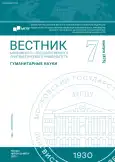Particularities of the Inventory of Phraseological Neologisms in Military-Political Discourse
- Autores: Nazarova N.E.1
-
Afiliações:
- Moscow State Institute of International Relations (MGIMO) University (Odintsovo)
- Edição: Nº 7(875) (2023)
- Páginas: 86-93
- Seção: Linguistics
- URL: https://bakhtiniada.ru/2542-2197/article/view/350747
- ID: 350747
Citar
Resumo
The article discusses some particularities of the language specialist’s lexicographic work with phraseological neologisms in texts created for the purpose of speech manipulation and drawing the rhetorical opponent into a discursive trap. A theoretical basis for the inventory of phraseological neologisms is also given. The problem is of interest in the framework of researches in the field of translation / interpretation, text analysis, discourse analysis, and political science. The problem acquires particular importance in the context of aggravated international relations.
Sobre autores
Nadezhda Nazarova
Moscow State Institute of International Relations (MGIMO) University (Odintsovo)
Autor responsável pela correspondência
Email: nadya_nne@mail.ru
Senior Lectuturer at the Department of Linguistics and T&I Studies
RússiaBibliografia
- Michaels, J. (2013). The discourse trap and the US military. From the War on Terror to the Surge. New York: Palgrave Macmillan.
- Kushneruk, S. L. (2012). Diskursivnyj i tekstovyj miry: vozmozhnosti urovnevoj stratifikacii diskursa = Discoursive and text worlds: possibilities of level stratification of discourse. Politicheskaja lingvistika, 2 (40), 93–102. (In Russ.)
- Torop, P. Kh. (1981). Problema inteksta = On the issue of intext. Trudy po znakovym sistemam,14, 33–44. (In Russ.)
- Ryabuha, O. V., Troshina A. V. (2018). Problem of typology of intertextual inclusions and their role in intertext structure (by material of magazine and newspaper articles). Nauchnyj dialog, 4, 134–146. (In Russ.)
- Docenko, E. L. (2000). Psihologiya manipulyacii: fenomeny, mekhanizmy i zashchita = Psychology of manipulation: phenomena, mechanisms and protection. Moscow: CheRo, Moscow State University. (In Russ.)
- Gavrin, S. G. (1963). Izuchenie frazeologii russkogo yazyka v shkole = Studying the phraseology of the Russian language at school. Moscow: Prosveshchenie. (In Russ.)
- Vendina, T. I. (2001). Vvedenie v yazykoznanie = Introduction to linguistics. Moscow: Vysshaya shkola. (In. Russ.)
- Dubrovin, M. I. (1977). Russkie frazeologizmy v kartinkah (dlya govoryashchih na anglijskom yazyke) = Russian phraseology in pictures (for English speakers). Moscow: Russky yazyk. (In. Russ.)
- Martin, P. (2021). China’s Civilian Army: The Making of Wolf Warrior Diplomacy. Oxford: Oxford University Press.
- Barkhudarov, L. S. (1974). Yazyk i perevod = Language, translation and interpretation. Moscow: Mezhdunarodnye otnosheniya.
- Komissarov, V. N. (1990).Teoriya perevoda (lingvisticheskie aspekty). Uchebnik dlya institutov i fakul’tetov inostrannyh yazykov = Translation theory (linguistic aspects). Textbook for institutes and faculties of foreign languages. Moscow: Vysshaya shkola. (In. Russ.)
Arquivos suplementares










